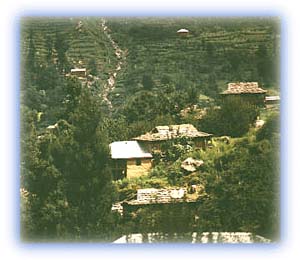Kinnaur himalayas
General Info
· The Satluj Saga
· The Story of the Baspa
· Valleys
· Hangrang valley
· Ropa valley
· Bhaba valley
· Other places of interest
· Nilchar
· Kalpa and Peo
· Pooh
· Moorang
Climate and Vegetation
People
· Kinners
Livelihood
· Villages in Kinnaur
Religion
· Hinduism
· Buddhism
· Superstitions and Beliefs
Fairs and Festivals
Art and architecture
History

![]()
| Traditions and Culture Marriages among the Kinnauras are based on khandans, or economic units. Traditionally, any breach of the system of khandan was considered a serious threat to the deep-rooted values of their society. An intra-khandan marriage is believed to annoy the local deity and bring evil to the couple, their family and the village as a whole. Members of a superior khandan do not marry those of an inferior khandan. However, these traditions are no longer strictly followed by the present younger generations of the Kinnauras, owing to the influence of modern civilization. |
 |
| Credit: Unknown |
Livelihood
The main sources of livelihood for the Kinnauras are animal
husbandry and agriculture. Those involved in animal husbandry
follow a nomadic or semi nomadic way of life. Alongside
agriculture, horticulture is also practised in the region.
Extensive vineyards, thriving crops and orchards of apricot,
apples and grapes are to be found in the entire region. Many
Kinnauras seek employment on a daily wage basis in government
projects, while others are in regular government service. The
rest are engaged in business and in weaving and other cottage
industries.
Kinnaur has also developed a fine tradition of brewing. Almost every house distills its own brews from the apricots, apples and grapes grown in the area. This activity is legal since Kinnaur is a tribal area.
All rights reserved